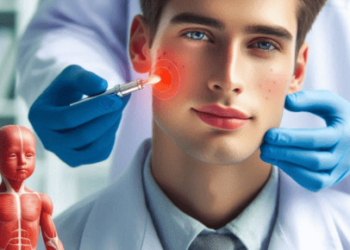Aging is inevitable, but that doesn’t mean we can’t take steps to maintain a youthful glow. Over the years, I’ve discovered that an effective anti-aging skincare routine can make a world of difference. It’s not just about looking younger; it’s about feeling confident in your skin.
In this article, I’ll share the key components of a skincare regimen that targets those pesky signs of aging. From essential products to daily habits, you’ll learn how to create a routine tailored to your skin’s needs.
Let’s dive into the secrets of maintaining a radiant, youthful complexion. For more personalized skincare tips and wellness strategies, explore holistic life coaching programs that focus on integrating beauty and health.
Understanding Skin Aging
Aging is natural, and understanding the process helps craft effective anti-aging skincare routines. This section explores factors affecting skin aging and identifies visible signs of aging skin.
Factors Affecting Skin Aging
Various factors contribute to skin aging. Intrinsic aging represents natural decline due to biological processes. Extrinsic factors, however, include environmental influences.
- Sun Exposure: Ultraviolet (UV) radiation causes photoaging. Research shows UV exposure contributes to up to 80% of visible aging. Sunscreen is vital.
- Pollution: Pollutants damage skin barriers, leading to oxidative stress and aging.
- Lifestyle Choices: Smoking, poor diet, and inadequate sleep directly impact skin health. Cigarette smoke contains toxins harming collagen and elastin, essential proteins for skin structure.
- Genetics: Genes play an undeniable role in how quickly skin shows age.
Signs of Aging Skin
Recognizing aging signs helps target them with specific products. Common signs include:
- Wrinkles and Fine Lines: Small creases, especially around eyes and mouth, indicate reduced collagen and elastin production.
- Dryness: Decreased natural oil production leads to dry, flaky skin.
- Sagging: Loss of skin elasticity causes sagging, often noticeable around the jawline and cheeks.
- Sunspots: Hyperpigmentation from prolonged sun exposure manifests as dark spots or sunspots.
- Thinning Skin: Thinner skin, prone to bruising, signals decreased cellular regeneration.
Understanding these factors and signs is essential for developing personalized skincare routines.
Essential Anti-Aging Skincare Components
Incorporating the right components into an anti-aging skincare routine is essential for maintaining youthful, healthy skin. Let’s explore key products that target aging signs and improve skin health.
Cleansers
Effective cleansers remove impurities and prepare the skin for the next steps. Using a gentle cleanser that maintains the skin’s natural barrier prevents over-drying and irritation. Look for ingredients like glycolic acid or salicylic acid to promote cell turnover, especially for mature skin. A morning and evening cleansing routine ensures impurities are removed.
Serums
Serums deliver potent ingredients directly to the skin. Choose serums containing antioxidants like Vitamin C, which combat free radicals, and retinol, which stimulates collagen production. Hyaluronic acid serums hydrate and plump skin, reducing the appearance of fine lines. Apply serums after cleansing but before moisturizing for maximum efficacy.
Moisturizers
Moisturizers lock in hydration and create a protective barrier. Opt for moisturizers with peptides to boost collagen and elastin production. Ingredients like ceramides help restore the skin barrier, and glycerin maintains hydration. Use a richer moisturizer at night to support the skin’s repair processes during sleep.
Sunscreen
Sunscreen is crucial to protect skin from harmful UV rays. Choose a broad-spectrum sunscreen with at least SPF 30. Daily use, even on cloudy days, prevents premature aging and sunspots. Physical sunscreens containing zinc oxide or titanium dioxide offer lasting protection. Apply sunscreen as the last step in your morning skincare routine and reapply as needed throughout the day.
Effective Anti-Aging Skincare Routine Steps
Establishing a consistent morning and evening skincare routine helps maintain a youthful complexion. Each routine focuses on addressing specific skin concerns and maximizing product efficacy.
Morning Routine
- Cleanse: I start my morning routine with a gentle cleanser to remove any overnight impurities. This step prepares my skin for the following products and ensures a fresh base.
- Antioxidant Serum: I apply a Vitamin C serum to brighten my skin and neutralize free radicals caused by UV exposure. This serum also helps fade dark spots and even out my skin tone.
- Moisturize: I use a lightweight moisturizer to hydrate my skin without making it greasy. Ingredients like hyaluronic acid retain moisture and keep my skin plump.
- Sunscreen: This is the most crucial step to protect my skin from sun damage. I choose a broad-spectrum SPF 30 or higher and reapply it every two hours if I’m outside.
- Remove Makeup and Cleanse: I remove my makeup with a gentle makeup remover or cleansing oil. Afterward, I cleanse my skin to eliminate any remaining impurities and allow better absorption of nighttime products.
- Exfoliate (2-3 Times a Week): Twice or thrice a week, I use a chemical exfoliant with glycolic acid to promote cell turnover and refine my skin texture. This step smooths my skin and reduces the appearance of fine lines.
- Retinol or Retinoid Serum: I apply a retinol or retinoid serum to stimulate collagen production and accelerate skin renewal. This step is essential for reducing wrinkles and improving skin elasticity.
- Moisturize and Nourish: I finish my routine with a richer moisturizer containing peptides and ceramides to repair my skin barrier and lock in moisture. This step ensures my skin stays hydrated and rejuvenated overnight.
Recommended Ingredients for Anti-Aging
Incorporating specific ingredients in an anti-aging skincare routine is essential to combat visible signs of aging. Below are key substances that can enhance skin health and rejuvenation.
Retinoids
Retinoids, derivatives of Vitamin A, promote cell turnover and boost collagen production. They reduce fine lines, wrinkles and improve skin texture. For best results, incorporate retinoids like retinol in the evening routine to avoid sun sensitivity.
Hyaluronic Acid
Hyaluronic acid, naturally occurring in the skin, holds up to 1,000 times its weight in water. It deeply hydrates and plumps the skin, reducing the appearance of fine lines. Apply hyaluronic acid-based products after cleansing and before moisturizing for optimal hydration.
Peptides
Peptides, short chains of amino acids, are essential for building proteins in the skin like collagen and elastin. They enhance skin elasticity and firmness. Use peptide serums or creams in both morning and evening routines for consistent results.
Antioxidants
Antioxidants, such as Vitamin C and E, neutralize free radicals that cause premature aging. They improve skin tone, texture and provide a brighter complexion. Apply antioxidant serums in the morning to protect against environmental damage, followed by sunscreen for added protection.
Lifestyle Tips to Enhance Skincare
In addition to a robust skincare regimen, making smart lifestyle choices significantly enhances skin health and delays the aging process. Here are some vital tips to incorporate into daily life.
Nutrition
Balanced nutrition directly impacts skin vitality. Consuming foods rich in antioxidants like berries, spinach, and nuts fortifies skin against oxidative stress. Omega-3 fatty acids, present in fish and flaxseed, maintain skin moisture and elasticity. Including lean proteins such as chicken and tofu supports collagen production. Avoid sugary and processed foods to minimize inflammation and breakouts.
Hydration
Proper hydration is crucial for maintaining skin’s plumpness and reducing the appearance of fine lines. Drinking at least 8 glasses of water daily keeps skin hydrated from within. Herbal teas and water-rich fruits like watermelon and cucumbers also contribute to hydration. Avoiding excessive caffeine and alcohol helps prevent skin dehydration and dullness.
Sleep
Quality sleep allows the skin to repair and regenerate. Aim for 7-9 hours of sleep each night for optimal skin recovery. Elevate your head slightly to reduce fluid retention under the eyes, which causes puffiness. Use silk pillowcases to minimize friction and reduce wrinkle formation. Avoiding screens before bedtime improves sleep quality and contributes to healthier-looking skin.










